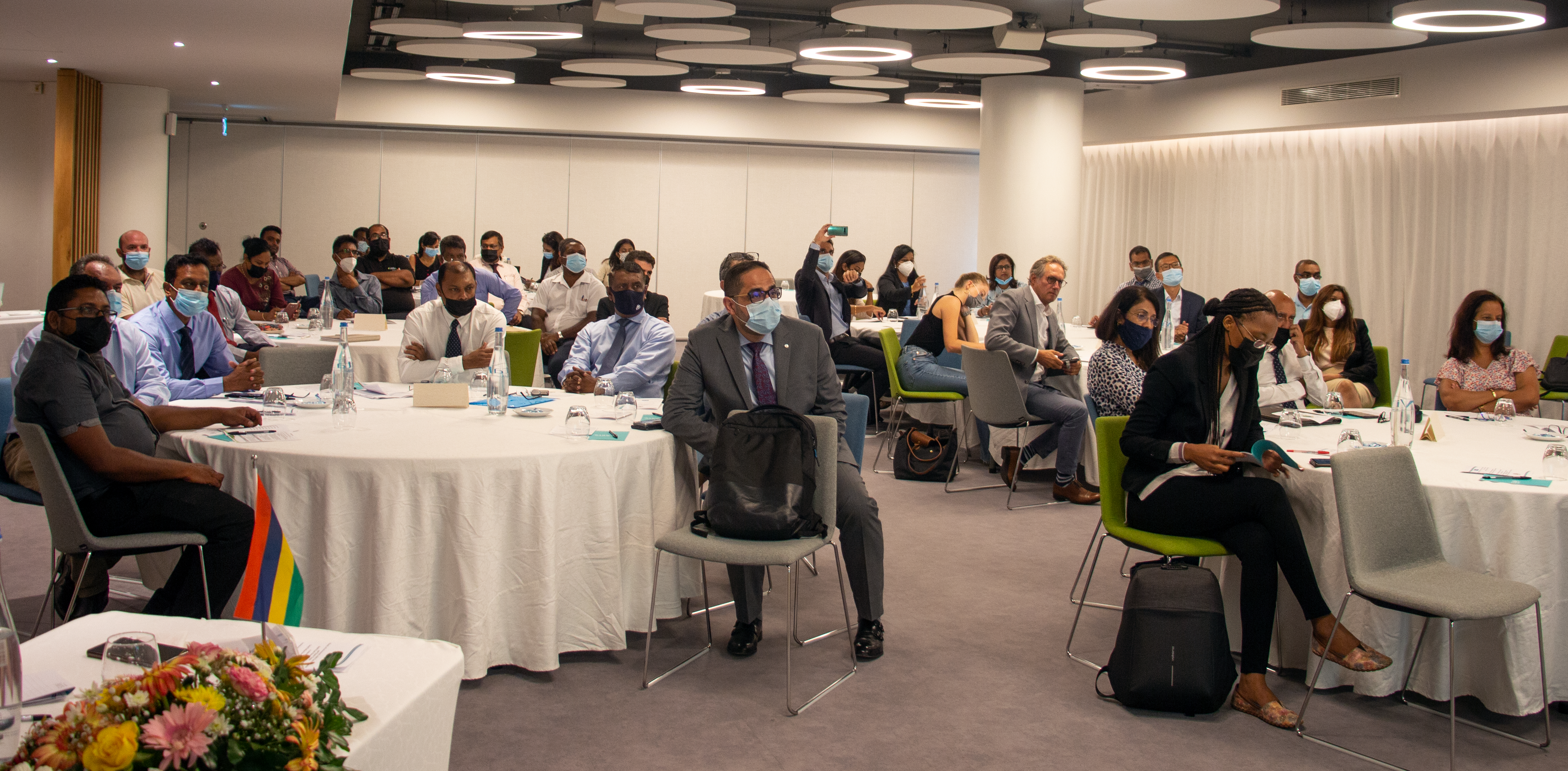This new legislative framework will encompass all legal provisions pertaining to solid and hazardous waste and will enable the implementation of a circular economy in the waste sector.
The UNDP supports a Consultative Workshop on the Development of an Integrated Waste Management Legislative Framework
February 9, 2022
Participants to the consultative workshop on 8 February 2022. Photo: Sharon Sunassee @ UNDP Mauritius.
A two-day consultative workshop on the development of an Integrated Waste Management Legislative Framework was organised on 8 and 9 February by the Ministry of Environment, Solid Waste Management and Climate Change in collaboration with the United Nations Development Programme (UNDP). The opening ceremony was attended by the Honourable Kavydass Ramano, Minister of Environment, Solid Waste Management and Climate Change; Ms. Amanda Serumaga, UNDP Resident Representative for Mauritius and Seychelles; Mrs. Sewah Doorgakant, Permanent Secretary of the Solid Waste Management Division, and Mr. Bhaguthsing Beerachee, Director of the Solid Waste Management Division.
Over the past 10 years, solid waste generation in Mauritius has been increasing at a rate of 2% per annum, mainly due to an increase in economic growth and associated changes in consumption. In 2021 for instance, over 500 000 tonnes of solid wastes were disposed at the Mare Chicose Landfill, which has managed more than 9 million tonnes of solid waste since it started operating in 1997. However, as waste generation increases, so does the importance of setting up an effective solid waste management system. To avoid issues such as pollution, related health risks, resource depletion and wastage, the Government is aiming to focus on waste prevention, reduction, reuse, and recycling as opposed to using the landfill.
A legal framework for the sound management of wastes is, therefore, fundamental to creating the appropriate conditions for the effective management of all waste streams. The Solid Waste Management Legislative Framework being developed aims to provide strategic direction and regulation for sustainable solid and hazardous waste management practices. This new framework will consolidate all the legal provisions pertaining to solid and hazardous waste contained in various laws and enable the implementation of a circular economy in the waste sector.
The UNDP has been supporting the Solid Waste Management Division in several initiatives over the past decade to enhance the waste management system in Mauritius. These include the ‘Implementing Sustainable Low and non-Chemical Development in SIDS’ known as the ISLANDS project. Approved by the Global Environment Facility (GEF) in December 2021, this project aims to protect human health and the environment from the harmful effects of hazardous chemicals and wastes. In the context of the consultative process on the development of an Integrated Waste Management Legislative Framework, the UNDP extended the technical expertise of three consultants, Mrs. Kelebogile Moremi, Legal Expert; Mr. Ammar Abu Drais, Solid Waste Expert, and Ms. Deeksha Namah, Legal Assistant.
A need to transition from the linear model to a circular economy approach
During the opening ceremony, the Honourable Kavydass Ramano, Minister of Environment, Solid Waste Management and Climate Change acknowledged that there is a need to transition from the linear model to a circular economy approach in developing the current waste management system. He stressed that: “The large amount of waste disposed at the landfill represents untapped potential for resource recovery and the development of the recycling centre.”
In her speech, Ms. Amanda Serumaga, UNDP Resident Representative for Mauritius and Seychelles, emphasised the importance of taking a comprehensive and inclusive approach for the sustainable and sound management of wastes. The UNDP Resident Representative stated that “The consultative process has to take into consideration the views of all relevant stakeholders, be it the public and private sectors and non-governmental organisations and academia.”
The two-day workshop included the participation of representatives of various ministries, and from the public and private sectors. Participants, organised into five technical working groups, considered themes including administration; registration and licensing; source segregation of solid waste, collection, and recycling; hazardous waste management; and commercial, industrial and institutional waste management. The views and recommendations of the stakeholders will be transcribed into legal text by the consultants and a draft legislative framework is expected by the end of March 2022.

 Locations
Locations




